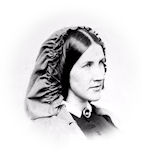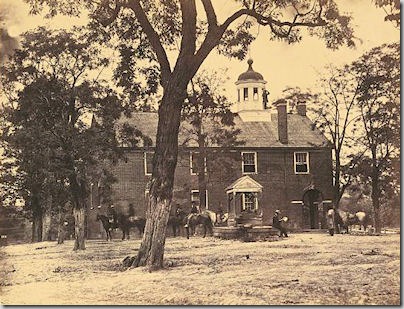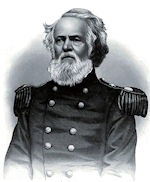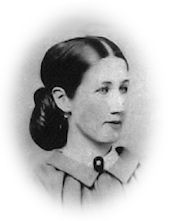
“No one knows, who did not watch the thing from the beginning, how much opposition, how much how much unfeeling want of thought, these women nurses endured. Hardly a surgeon whom I can think of, received or treated them with even common courtesy. Government had decided that women should be employed, and the army surgeons—unable, therefore, to close the hospitals against them—determined to make their lives so unbearable that they should be forced in self-defence to leave. It seemed a matter of cool calculation, just how much ill-mannered opposition would be requisite to break up the system.
Some of the bravest women I have ever known were among this first company of army nurses. They saw at once the position of affairs, the attitude assumed by the surgeons and the wall against which they were expected to break and scatter; and they set themselves to undermine the whole thing.
None of them were ‘strong-minded.’ Some of them were women of the truest refinement and culture; and day after day they quietly and patiently worked, doing, by order of the surgeon, things which not one of those gentlemen would have dared to ask of a woman whose male relative stood able and ready to defend her and report him. I have seen small white hands scrubbing floors, washing windows, and performing all menial offices. I have known women, delicately cared for at home, half fed in hospitals, hard worked day and night, and given, when sleep must be had, a wretched closet just large enough for a camp bed to stand in. I have known surgeons who purposely and ingeniously arranged these inconveniences with the avowed intention of driving away all women from their hospitals.
These annoyances could not have been endured by the nurses but for the knowledge that they were pioneers, who were, if possible, to gain standing ground for others,—who must create the position they wished to occupy. This, and the infinite satisfaction of seeing from day to day sick and dying men comforted in their weary and dark hours, comforted as they never would have been but for these brave women, was enough to carry them through all and even more than they endured.
At last, the wall against which they were to break, began to totter; the surgeons were most unwilling to see it fall, but the knowledge that the faithful, gentle care of the women-nurses had saved the lives of many of their patients, and that a small rate of mortality, or remarkable recoveries in their hospitals, reflected credit immediately upon themselves, decided them to give way, here and there, and to make only a show of resistance. They could not do without the women-nurses; they knew it, and the women knew that they knew it, and so there came to be a tacit understanding about it.
When the war began, among the many subjects on which our minds presented an entire blank was that sublime, unfathomed mystery ‘Professional Etiquette.’ Out of the army, in practice which calls itself ‘civil,’ the etiquette of the profession is a cold spectre, whose presence is felt everywhere, if not seen; but in the Medical Department of the Army, it was an absolute Bogie, which stood continually in one’s path, which showed its narrow, ugly face in camps and in hospitals, in offices and in wards; which put its cold paw on private benevolence, whenever benevolence was fool enough to permit it; which kept shirts from ragged men, and broth from hungry ones; an evil Regular Army Bogie, which in full knowledge of empty kitchens and exhausted ‘funds,’ quietly asserted that it had need of nothing, and politely bowed Philanthropy out into the cold.
All this I was profoundly ignorant of for the first few months of the war, and so innocently began my rounds with my little jelly pots and socks knit at home for the boys—when, suddenly, I met the Bogie;—and what a queer thing he was! It was a hot summer morning, not a breath of air coming in at the open windows—the hospital full of sick men, and the nurses all busy, so I sat by a soldier and fanned him through the long tedious hours. Poor man, he was dying, and so grateful to me, so afraid I should tire myself. I could have fanned him all day for the pleasure it was to help him, but the Bogie came in, and gave me a look of icy inquiry. My hand ought to have been paralysed at once, but somehow or other, it kept moving on with the fan in it, while I stupidly returned the Bogie’s stare.
Finding that I still lived, he quietly made his plan, left the room without saying a word, and in ten minutes afterward developed his tactics. He was a small Bogie—knowing what he wanted to do, but not quite brave enough to do it alone; so he got Miss Dix, who was on hand, to help him, and together, they brought all the weight of professional indignation to bear upon me. I ‘must leave immediately.’ Who was I, that I should bring myself and my presumptuous fan, without direct commission from the surgeon-general,’ into the hospital? ‘Not only must I leave at once, but I must never return.’
This was rather a blow, it must be confessed. The moment for action had arrived—I rapidly reviewed my position, notified myself that I was the Benevolent Public, and decided that the sick soldiers were, in some sort, the property of the B. P. Then I divulged my tactics. I informed the Bogies (how well that rhymes with Fogies) that I had ordered my carriage to return at such a hour, that the sun was hot, that I had no intention whatever of walking out in it, and that, in short, I had decided to remain. What there was in these simple facts, very quietly announced, to exorcise the demon, I am unable to say, but the gratifying result was that half an hour afterward Professional Etiquette made a most salutary repast off its own remarks; that I spent the remainder of the day where I was; that both the Bogies, singly, called the next morning to say—‘Please, sir, it wasn’t me, sir, —’twas the other boy, sir;’ and from that time the wards were all before me.”

 —The advance column of the National army occupied Fairfax Court House, Va., at eleven o’clock to-day, meeting with no opposition from the Confederates either on the march or in taking possession of the place. Trees had been felled across the road and preparations made at one point for a battery, but there were no guns or troops on the route. The Confederates were drawn up beyond the town and a battle was expected, but as the National forces pressed on they retreated. The cavalry followed them some miles toward Centreville, but the heat of the weather and the previous long march prevented the infantry following. The abandonment of the village by the Confederates was so sudden that they left behind them some portions of their provisions, intrenching tools, and camp furniture. The army advances in three columns, one on the Fairfax road, and the others to the north and south of the road. The advance will be continued to Centreville, eight miles beyond Fairfax, where the Confederates will probably make a stand if they design attempting to hold Manassas Junction. The only casualties reported by Gen McDowell are an officer and three men slightly wounded.—(
—The advance column of the National army occupied Fairfax Court House, Va., at eleven o’clock to-day, meeting with no opposition from the Confederates either on the march or in taking possession of the place. Trees had been felled across the road and preparations made at one point for a battery, but there were no guns or troops on the route. The Confederates were drawn up beyond the town and a battle was expected, but as the National forces pressed on they retreated. The cavalry followed them some miles toward Centreville, but the heat of the weather and the previous long march prevented the infantry following. The abandonment of the village by the Confederates was so sudden that they left behind them some portions of their provisions, intrenching tools, and camp furniture. The army advances in three columns, one on the Fairfax road, and the others to the north and south of the road. The advance will be continued to Centreville, eight miles beyond Fairfax, where the Confederates will probably make a stand if they design attempting to hold Manassas Junction. The only casualties reported by Gen McDowell are an officer and three men slightly wounded.—(







